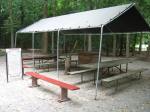Voted the Best Place to See by Condé Nast Traveler.

For most of the twentieth century and into the twenty-first century, plantation tourist sites in the Charleston area were not places to learn about African American history. This was a glaring oversight. Charleston was the dominant North American port in the trans-Atlantic slave trade, and enslaved Africans and African Americans made up the majority of South Carolina’s population throughout this area’s colonial and antebellum history. Though the life experiences of these men, women, and children varied across the urban and rural contexts of the Lowcountry, the overwhelming majority lived and worked in the fields of plantations, such as those found along Ashley River Road, including Drayton Hall. Despite the struggles of chattel slavery, particularly constant vulnerability to sale or punishment, these individuals
retained powerful West African traditions and crafted a new African American culture in the plantation context. After Emancipation, free African Americans still faced considerable obstacles due to racial discrimination, particularly through the development of Jim Crow laws and African American disenfranchisement. They made a range of choices about how to construct new lives in this volatile context, from continuing to work as a sharecropper, working for low wages on the plantation, or seeking work elsewhere.
Despite this rich, diverse history, plantation tours in Charleston traditionally focused on white elite experiences and material wealth in big houses and gardens; but in recent years this pattern has started to change. By 2012 most plantation sites in the Charleston area have introduced African American history tours. My PhD. dissertation research, which began in 2007 and continues into the present, focuses on documenting how these new tours developed in the Charleston area, including at Drayton Hall, and considers how historic representations may continue to change in the future. Drayton Hall’s African American history interpretation began with Richmond Bowens, who was descended from enslaved African Americans at Drayton Hall. Bowens was born at Drayton in 1908, and returned to Charleston from Chicago in the 1970s. He started working at Drayton Hall again as a gatekeeper of what was then a newly established National Trust site. In the 1990s, site director Dr. George McDaniel asked Bowens to

Outdoor location of Connections tour that began at Drayton Hall in the early 2000s. Includes mortar and pestle to describe how enslaved Africans and their African American descendants African-American processed rice, a major cash crop in South Carolina's history.
start telling visitors about his experiences growing up at Drayton Hall, and about the oral traditions passed down in his family, from the porch of the caretaker’s cottage (which currently houses the gift shop). After Bowens passed away in 1998, site producers decided to develop a formal African American history tour. They introduced “Connections” in the early 2000s, which is based on scholarly research as well as Bowens‘ oral traditions. Since then, Drayton Hall also opened the African American cemetery on the site to visitors, adding an intricate wrought iron archway designed by renowned blacksmith Phillip Simmons. In addition, the site has introduced a DVD tour option that includes African American history information, and site managers started encouraging guides to include more descriptions of African American history in the house tours as well as the Connections tour.
These changes are significant, but there is still great potential for further historic interpretation development. One of the greatest interpretive challenges that plantation sites in Charleston continue to face is what scholars Jennifer L. Eichstedt and Stephen Small describe as “segregation of knowledge,” where African American history tours, while informative, remain largely separate from tours in the house and gardens. The reasons for this range from tour time constraints to the challenge of asking guides and visitors to confront that the white elite wealth portrayed in the architecture and landscapes of plantation houses and gardens came from coerced African American skills and labor. The relationships between Euro Americans and African Americans on plantation sites both during and after slavery ranged widely, but while individuals across races certainly influenced each others’ lives, and even collaborated at times, their interactions always took place within a painfully unequal racial hierarchy.
As Drayton Hall develops site interpretation in the future, site producers can continue to build on their efforts to make

Guide Rosemary Geisy describes the dark, narrow staircase that would have been used by enslaved and later free African-Americans working at Drayton Hall.
African American history a more cohesive part of historic interpretation throughout the site. The future interpretive center, which is still in the planning phases, is a particularly great opportunity to exhibit more in-depth information and artifacts that could not only provide insight into African American history at the site, but also into the intertwined race and class labor and social systems that defined plantation life, and which still have repercussions for race and class relations in Charleston and throughout the United States today. One of the greatest contributions visitors can make in this process of change is to explore the African American history tours and interpretive spaces currently available at plantation sites such as Drayton Hall. They can then let guides and site producers know what they find to be informative and powerful about their tour experiences, and where they have questions, concerns, and suggestions for how these representations may continue to develop in the future.
Mary Battle is a PhD Candidate at Emory University’s Institute for Liberal Arts. Her email address is marypbattle@yahoo.com.